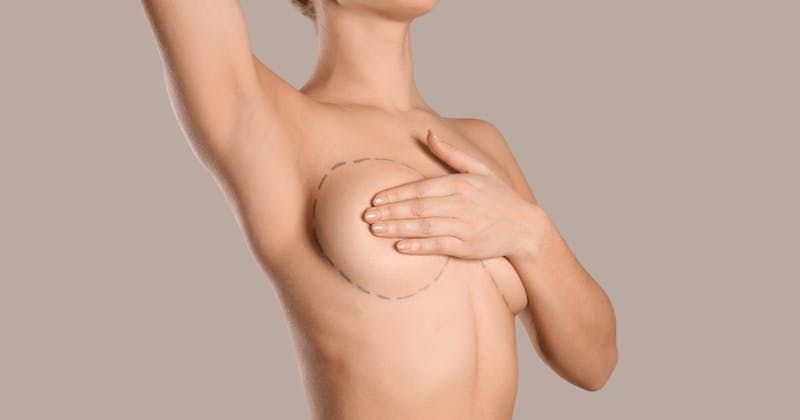
Expect some discomfort and swelling during the first week of breast augmentation recovery. It may be challenging to move your arms freely, and you may need help with daily activities such as getting dressed, showering, and going to the restroom. You must take it easy. Rest is crucial for your recovery, so refrain from strenuous activities or lifting heavy objects for a few weeks. This can help minimize additional pressure and protect the healing nerves.
Most of your pain and swelling should improve by the second week, and you can gradually resume your normal routine. In the third and fourth weeks, you may still have mild soreness and occasional swelling, but it diminishes in time.
Recovery Six Weeks Post-Breast Augmentation Surgery
By the fifth and sixth weeks, you feel much better and can fully engage in physical activities. By the eighth week, your breasts should look and feel natural, and any residual discomfort should be minor.
Breast Augmentation Recovery Aftercare Tips
How to Relieve Nerve Pain After Breast Augmentation
There are several effective ways to relieve nerve pain after getting breast augmentation surgery. Some of the best methods are listed below:
- Take prescribed pain medication: Your doctor may prescribe pain relievers to manage nerve pain after the surgery. Take them as directed, as they can significantly reduce discomfort
- Use ice packs: Applying ice packs to the affected area can help numb the nerves and reduce pain. Wrap the ice pack in a thin cloth and gently place it on your breasts for about 15 minutes at a time
- Wear a supportive bra: Opt for a comfortable bra that offers proper support. A sports bra without underwire can help minimize movement and pressure on the breasts, which in turn relieves nerve pain
- Practice relaxation techniques: Stress and tension can intensify nerve pain. Explore relaxation techniques such as deep breathing, meditation, or listening to calm music to help ease your discomfort
- Light stretches: Gentle stretching exercises can help alleviate nerve pain and improve blood circulation. Consult your surgeon for appropriate stretches that won’t strain your healing incisions
- Follow a healthy diet: Consuming a well-balanced diet with plenty of fresh fruits, vegetables, and lean proteins can support the healing process and reduce inflammation, potentially reducing nerve pain
- Avoid irritating substances: Nicotine, alcohol, and caffeine can impede healing and exacerbate nerve pain. Try to avoid or minimize these substances until your recovery is complete.
Remember to consult your doctor if your nerve pain persists or worsens. They can provide further guidance and suggest additional treatment options.
How to Sleep After Breast Augmentation Surgery
The best way to sleep after breast augmentation surgery is by following these steps:
- Lie down on your back on a firm mattress or use a few pillows to slightly elevate your upper body
- Keep your surgical bra or a comfortable sports bra on during sleep to provide support and stabilize your newly augmented breasts
- Place a small pillow or rolled-up towel under each arm to keep them slightly away from your chest, minimizing pressure and discomfort
- Use extra pillows to support your neck, shoulders, and lower back, ensuring proper alignment and reducing strain on these areas
- Avoid sleeping on your stomach or sides for at least a few weeks, as it can put undue pressure on your breasts and hinder the healing process
By following these guidelines, you can provide optimal support, avoid unnecessary discomfort, and promote a smooth recovery after breast augmentation surgery.
Breast Augmentation Recovery FAQs
How Long After Breast Augmentation Can I Drive?
After breast augmentation surgery, you should wait until you fully recover before driving again. Most individuals typically take around two to four weeks to heal adequately and regain the strength and movement needed to operate a vehicle safely. Following your surgeon’s recommendations and considering any pain or discomfort experienced is crucial. Overall, you should not rush back into driving until you feel completely comfortable and confident.
What to Wear After Breast Augmentation
Your surgeon provides or recommends the best medical compression bra after breast augmentation. Additionally, they provide instructions on how long you must wear your compression garment. On average, most patients wear their medical compression bra every day and every night for one to two weeks. After the two-week mark, patients can transition to a supportive sports bra.
How Long After Breast Augmentation Can I Work out?
It is generally safe to resume light walking immediately following breast augmentation surgery. Short walks are recommended as walking helps to prevent blood clots post-surgery. However, any heavy, strenuous exercise should be avoided for four to six weeks until your doctor gives you the green light. Following aftercare instructions is important to have a smooth recovery and ensure optimal results.
On average, patients are fully healed and can resume all forms of exercise, including cardio, within six weeks of breast augmentation. Breast implants should not prevent you from having an active lifestyle. There is no need to stop running, lifting weights, or other forms of exercise after a breast augmentation.
Breast Augmentation in Chicago, IL
If you’re considering a breast augmentation in Chicago, Illinois, to enhance your figure and provide long-lasting results, breast implants can help you achieve that. Learn more about breast augmentation by contacting Concierge Aesthetics & Plastic Surgery to schedule your complimentary consultation with our experts. Call us at (312) 255-1495 or visit us online to learn how breast enhancement can help you improve your bust size and shape and enjoy a more feminine appearance for years.



